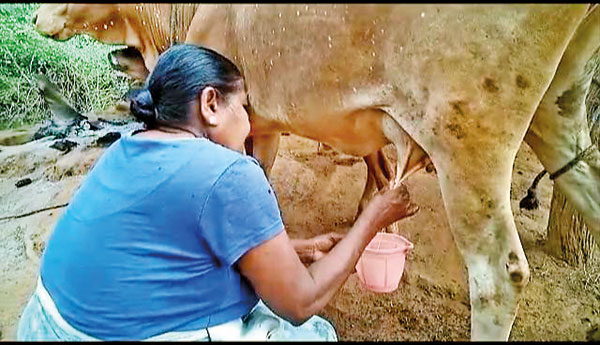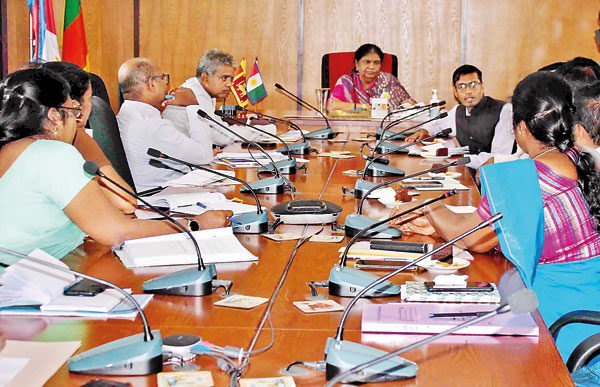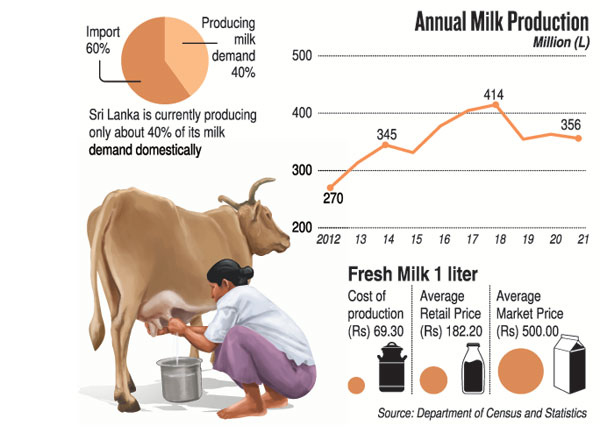News
Sri Lanka aims for self-sufficiency in fresh milk with Indian, French aid
View(s):By Nadia Fazlulhaq
With India and France ready to assist the country’s dairy industry, being self-sufficient in milk is possible, but first authorities will have to address concerns, experts advise.
This week, IDELF France Institut De L’Elevage (French Livestock Institute) and AFD (French Agency for Development) granted their preliminary approval to provide 700,000 euros (Rs.250 million).
According to the Agriculture Ministry, the donor agencies will support capacity development of the dairy industry, to enhance the quality of milk and to strengthen dairy farming.
The Cabinet this month approved a proposal by President Ranil Wickremesinghe and Agriculture Minister Mahinda Amaraweera to sign a joint declaration of intent between India and Sri Lanka to improve the quality of dairy products here and make the country self-sufficient in milk production.

Daily production is very low with small scale livestock farmers. Pix by Romesh Madushanka
Dr. M.B.P. Kumara Mahipala, senior lecturer in Animal Science at the Department of Animal Science, Faculty of Agriculture, University of Peradeniya said despite many attempts to revive the dairy industry, for the past two decades local production has been between 38-42% of the demand.
“The country has not been able to increase milk production. It’s important to bring quality semen instead of importing cows at a huge cost. It’s a waste importing cows if authorities are unable to provide climate conditions similar to the ones the animals are used to. Some of the imported cows who were at Ridiyagama farm really struggled with the climate and little feed. Right housing is essential,” he said.
He said private sector farms in the country provide cows with quality feed to increase production.
“The private sector is able to produce about 30-32 litres per cow per day, with increased feed and proper care. This is not happening with small scale livestock farmers, hence the daily production is very low with about 18 litres or less per cow. This has to be increased by at least 10 litres,” Dr.Mahipala said.
He said it is necessary to feed cows with quality forage to increase production.
“Private sector imports alfalfa, which is good nutritional forage for cows more than grass to feed cows to increase milk production. Increased feed is essential,” the expert in animal science added.

Northern Governor P.S.M. Charles meeting Shri Raakesh Natraj Consul General of India in Jaffna and other officials
“In India and in Jaffna the distribution system is strong. The cooperative societies could be used for this. Refrigerator facilities need to be provided to cooperatives to make fresh milk available in all areas,” he said.
Dr. T.S.P. Jayaweera, head of the Department of Livestock Production at Sabaragamuwa University said the country has the potential to be self sufficient in milk but needs to keep in mind past mistakes.
“Previously, to improve the gene pool, animals were brought from Australia and New Zealand but due to lack of feed, no monitoring system, lack of necessary medication, vaccination and environment factors some couldn’t perform well. We should focus on increasing production from the existing cows,” he said.
In 2021, the country had a cattle population of 1,650,296.
“It is important to have more veterinary surgeons especially in cattle breeding areas. Unfortunately here we have a shortage of vet surgeons and more are migrating too. The Government should encourage youth to take veterinary science as a subject and deploy public health inspectors to all small divisions so that a farmer could quickly approach in a medical emergency,” Dr. Jayaweera said.
He said while providing milk at a low price, the Government should put a considerable effort to promote drinking of fresh milk.
State Minister of Livestock Development D.B. Herath said the country spent Rs.58 billion for milk and milk based products imports in 2021.

“The Government has realised the importance of increasing feed, strengthening veterinary services, and breeding. We are paying an allowance of Rs. 20,000 for those who cultivate grass as a crop,” he said. There are also plans to ask the National Youth Council to train children of those in the livestock industry.
The Governor’s Office in Northern province has begun a programme to retain the 14,000 litres of milk daily transported to other provinces and to promote production of milk and milk-based products to be consumed within the province.
At a meeting between Northern province Governor P.S.M. Charles and Consul General of India in Jaffna Shri Raakesh Natraj, it was proposed to provide training and technical assistance for those in the livestock industry interested in new milk based products.
The best way to say that you found the home of your dreams is by finding it on Hitad.lk. We have listings for apartments for sale or rent in Sri Lanka, no matter what locale you're looking for! Whether you live in Colombo, Galle, Kandy, Matara, Jaffna and more - we've got them all!

